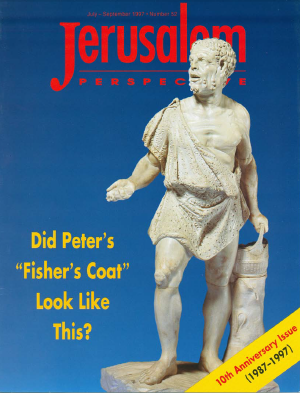Response revised: 9-Apr-2012
Comment from Peter W. V. Gurney (Wolverhampton, West Midlands, England) that was published in the “Readers’ Perspective” column of Jerusalem Perspective 52 (Jul.-Sept. 1997): 8.
I read with interest the late Robert Lindsey’s article entitled “Paraphrastic Gospels” in the April-June 1996 issue, and should like to comment on his remarks about Jesus’ words on the cross: “My God, My God, why have you forsaken me?” (Mk. 15:34). Lindsey suggests that Mark’s version is “another example of Mark’s editorial replacement habit” (p. 14). However, Matthew also records that Jesus uttered the same words (Mt. 27:46). Lindsey found Mark’s version “difficult to grapple with theologically,” but if we accept what God has revealed of Himself in canonical Scripture then the Father did indeed abandon the Son, as Paul showed, through the Son “being made a curse for us” (Gal. 3:13). This statement is paralleled elsewhere (2 Cor. 5:21; 1 Pet. 2:24).
In identifying with us Jesus passed through the same sequence of conditions we each experience as believers. First, in Adam, we have died spiritually and so, mysteriously, Jesus in the hours of darkness on the cross was cut off from the Father and was thus spiritually dead. Then, by saving faith we become alive in Christ spiritually, and so also Jesus, in commending his spirit into the Father’s hands, returned to fellowship with the Father. After coming to life spiritually we shall die physically, and so, too, Jesus died physically after being reunited with the Father. Finally, we shall rise from the dead physically just as Jesus did.
David Bivin responds:
I do not agree with you that God abandoned his son Jesus. Contrary to what you assert above, Matthew does not record that “Jesus uttered the same words [as in Mark’s Gospel]” in Mt. 27:46. Matthew, or possibly a later copyist, introduces a small change—“Eli, Eli.” Mark has “Eloi, Eloi, lama sabachthani?” and then remarks that the bystanders thought Jesus was calling for Elijah. However, in Aramaic the play “my God [eli]” and “Eli,” the shortened form of Eliyahu (Elijah), is lost. As he copies Mark’s text, Matthew apparently notices this difficulty and corrects to “Eli, Eli, lama [or, lema] sabachthani?”—a mixture of Hebrew (Eli, Eli) and Aramaic (lama sabachthani).
The problematic “Eloi, Eloi” in Mark is further evidence that Mk. 15:34-36 may be a Markan enhancement of an earlier text that was similar or identical to the much shorter Lukan text. It is not only that in Mark Jesus is portrayed as abandoned by God (in contrast to Luke’s “Into your hands I entrust my spirit,” what one would expect on the lips of a dying, observant Jew); but, in addition, Mark’s text appears to be a midrashic expansion of the original version of Jesus’ death on the cross.
































































































